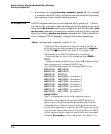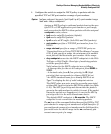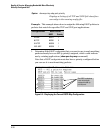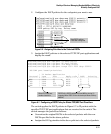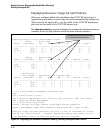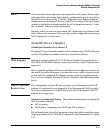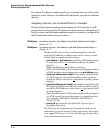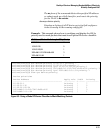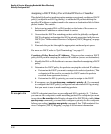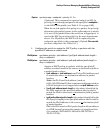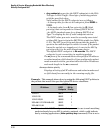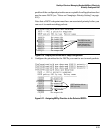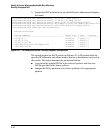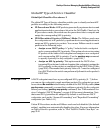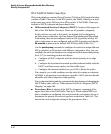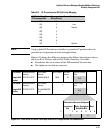
Quality of Service: Managing Bandwidth More Effectively
Globally-Configured QoS
Assigning a DSCP Policy For a Global IP-Device Classifier
This global QoS packet-marking option assigns a previously configured DSCP
policy (codepoint and 802.1p priority) to outbound IP packets having the
specified IP address or subnet mask in the source or destination field of their
packet header. The switch:
1. Selects an incoming IPv4 or IPv6 packet on the basis of the source or
destination IP address or subnet mask it carries.
2. Overwrites the DSCP in matching packets with the globally configured
DSCP codepoint, and assigns the 802.1p priority associated with the new
DSCP. (See “Differentiated Services Codepoint (DSCP) Mapping” on page
6-88.)
3. Forwards the packet through the appropriate outbound port queue.
For more on DSCP, refer to “QoS Terminology” on page 6-7.
Creating a Policy Based on IP Address. This procedure creates a DSCP
policy for IP packets carrying the selected IP address (source or destination).
1. Identify the IPv4 or IPv6 address to use as a classifier for assigning a DSCP
policy.
2. Determine the DSCP policy for packets carrying the selected IP address:
a. Determine the DSCP you want to assign to the selected packets. (This
codepoint will be used to overwrite the DSCP carried in packets
received from upstream devices.)
b. Determine the 802.1p priority you want to assign to the DSCP.
3. If necessary, use the qos dscp-map < codepoint > priority < 0 - 7 > command
to configure the DSCP policy (codepoint and associated 802.1p priority)
that you want to use to mark matching packets.
Prerequisite A DSCP codepoint must have a preconfigured 802.1p priority (0 - 7) before
you can use the codepoint to mark matching packets. If a codepoint you want
to use shows No-override in the Priority column of the DSCP Policy table (show
qos dscp-map command), you must first configure a priority for the codepoint
before proceeding (qos dscp-map priority command). See “Differentiated Ser-
vices Codepoint (DSCP) Mapping” on page 6-88 for more information.
6-36



